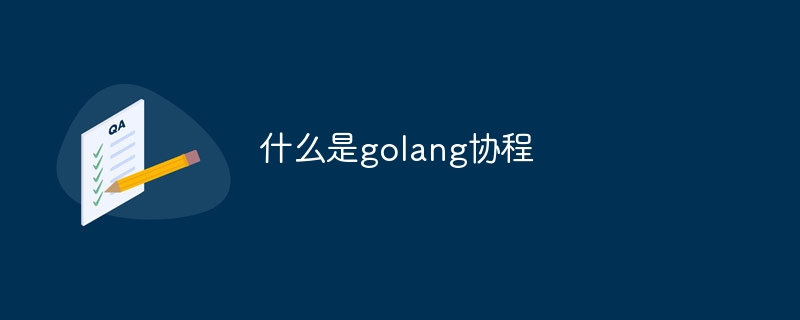Home >Common Problem >What is golang coroutine
What is golang coroutine
- DDDOriginal
- 2023-08-01 15:06:011568browse
Golang coroutine is a very powerful and efficient concurrency mechanism. By providing lightweight threads and convenient communication methods, developers can easily write highly concurrent programs. The use of coroutines can greatly simplify concurrent programming and split a complex task into multiple smaller ones. subtasks and execute these subtasks in parallel in the form of coroutines. Coroutines can also be used to handle IO-intensive tasks. When waiting for IO operations, they will automatically switch to other coroutines to maintain CPU utilization.

#The operating environment of this article: Windows 10 system, go1.20 version, dell g3 computer.
With the development of computer science, more and more programming languages have emerged. Each of these languages has its own characteristics and application scenarios. Among them, golang (Go language) has attracted much attention due to its excellent concurrency features. In golang, goroutine is a very important concept, which greatly improves the concurrency performance and maintainability of the program.
Coroutine is a lightweight thread that is managed and scheduled by the golang runtime system. Compared with threads in traditional operating systems, coroutines are more flexible and efficient. Each coroutine requires very little memory, so a large number of coroutines can be created and they are started and destroyed very quickly. This makes it possible for golang to support high concurrency and large-scale task processing.
Golang’s coroutines are very different from those of other programming languages. First of all, any function can be run as a coroutine by adding the keyword "go" in front of the function. This allows developers to easily convert an ordinary function into a concurrent task. Secondly, communication between coroutines is very convenient. Golang provides a data structure called "channel" for data transfer between coroutines. Coroutines can send data to channels and receive data from channels. This method achieves synchronization and mutual exclusion between coroutines. Finally, golang's coroutine scheduler adopts a strategy called "GOMAXPROCS", which can automatically adjust the concurrency of coroutines according to the number of cores of the computer to make full use of computing resources.
The use of coroutines can greatly simplify concurrent programming. Since coroutines are started and destroyed very quickly, developers can split a complex task into multiple smaller subtasks and execute these subtasks in parallel in the form of coroutines. This approach not only improves the concurrency performance of the program, but also makes the code more readable and maintainable.
In addition, coroutines can also be used to handle IO-intensive tasks. In the traditional multi-threading model, threads are blocked while waiting for IO operations to complete, thus wasting computing resources. In golang, coroutines will automatically switch to other coroutines when waiting for IO operations to maintain CPU utilization. This approach not only improves the concurrency performance of the system, but also avoids the overhead of context switching between threads.
To sum up, golang's coroutine is a very powerful and efficient concurrency mechanism. It allows developers to easily write high-concurrency programs by providing lightweight threads and convenient communication methods. The use of coroutines can not only improve the performance and maintainability of the program, but also simplify the complexity of concurrent programming. I believe that with the popularity and development of golang, the application of coroutines will become more and more widespread.
The above is the detailed content of What is golang coroutine. For more information, please follow other related articles on the PHP Chinese website!

